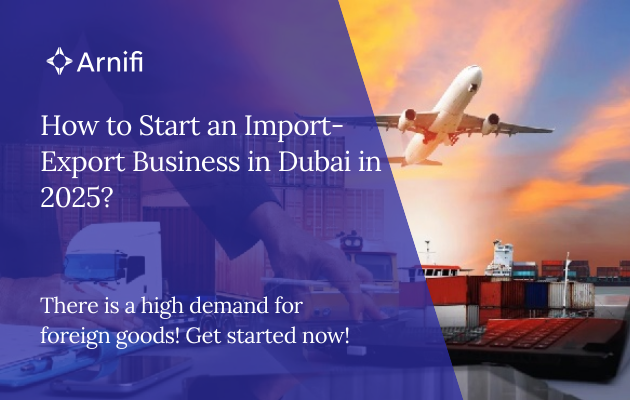How to Start an Import-Export Business in Dubai in 2025?
by Shethana Apr 29, 2025  11 MIN READ
11 MIN READ

Are you thinking of starting an import-export business in Dubai? Get started now! Dubai is considered a global trade hub, due to its strategic location between Europe, Asia & Africa.
This attracts businesses like – trade, import/export, logistics, and more which play a crucial role in international commerce.
One of the largest ports, Jebel Ali, and this emirate’s advanced air cargo capabilities is an ideal location for import and export activities.
Apart from the location the country provides business-friendly policies, low taxation, and smooth customs duty charges on import & export.
These make the business more profitable and provide options to scale large.
At present there is also a high demand for foreign goods exchange between – GCC, Africa, and South Asia which provides an excellent import/export business opportunity.
This article provides deep insights on what are the policies, registration process, required license type, and average cost prices required to set up an import-export business in Dubai.
Table of contents
- Why Choose Dubai for an Import-Export Business?
- What is an Import-Export Business?
- Step-by-Step Process to Start an Import-Export Business in Dubai
- Step 01 – Decide on Products and Markets
- Step 02 – Choose Business Jurisdiction
- Step 03 – Choose a Business Structure
- Step 04 – Reserve Trade Name & Initial Approvals
- Step 05 – Prepare Legal Documents and Lease Office
- Step 06 – Apply for Trade License
- Step 07 – Register with Dubai Customs
- Step 08 – Open a Corporate Bank Account
- Licensing & Registration in Detail
- Legal & Regulatory Requirements
- Financial Considerations
- Logistics & Supply Chain Management
- Government & Private Support Services
- Conclusion
Why Choose Dubai for an Import-Export Business?
As discussed Dubai’s location and connectivity to different countries make it the best spot to establish import export business.
These days transfer of goods around the world has become one of the biggest challenge.
Therefore setting a unique business structure can make you stand out from the competitors and generate good revenue.
With the help of world-class infrastructure and the support system for these operations, this emirate can be the right choice for import-export business.
The presence of two gains ports i.e., Jebel Ali Port & Al Maktoum International Airport with huge cargo capacities and streamlined logistics is an advantage.
Along with these, there are other hubs and free zones – namely Dubai South and the Dubai Airport Freezone (DAFZA) provide end-to-end supply chain support.
Dubai’s government implements policies that help businesses grow and develop, giving the owners the freedom to retain profits through low-tax policies.
Easy, smooth, and digitalized process for company registrations. Also, Entrepreneurs get full foreign ownership in almost all free zones and 100% repatriation of profits.
What is an Import-Export Business?
In general, the import-export business involves, buying & selling goods across the countries.
Importing refers to bringing in products from others, and exporting refers to selling domestic products to international markets.
This process is commonly known as trading. In Dubai, these activities are centralized and have a thriving role as a global facilitator.
The majority of the goods are based on electronics, textiles, food products, and automotive components. Under these categories, there comes machinery, luxury products, and country-specific food products.
Not only importing but Dubai also stands out in producing domestic products “Made in Dubai” products to export to other countries.
There is also another concept called ‘re-export’. Here the goods reach Dubai and are again exported without any modification due to the advanced logistics and customs support.
Among all these processes, the most common trade structure is direct trading. Here the business owner buys & sells goods to customers directly without any middleman.
The other structure is through distribution, where products are supplied to retailers or wholesalers to different customers.
This model offers different advantages depending on the target market, product type, and logistical strategy.
Step-by-Step Process to Start an Import-Export Business in Dubai
Step 01 – Decide on Products and Markets
Conduct in-depth market research, analyze the gaps, and try to fit in the gaps with your business idea. It could be solving the logistic problem, getting the products, labor problems, etc.
Choose the product industry type, select which products you want to trade, and what are the high-demand products. By supplying these you have the opportunity to generate huge profits.
Step 02 – Choose Business Jurisdiction
The trade business can happen in both the mainland and the free zone. The businesses in the Mainland are licensed by DET – Department of Economy and Tourism, allowing them to trade freely within UAE and internationally. Free zones like – JAFZA, DAFZA, or Dubai South are most preferred to start an import-export business. The free zones offer 100% ownership, tax exemptions, and more simplified procedures. However, the free zone companies have restrictions to enter mainland business.
Step 03 – Choose a Business Structure
The commonly used business structures for import-export businesses in Dubai:
- Limited Liability Company (LLC): The business is under partnership, while this structure protects its owners from personal liability for the company’s debts and obligations. Best suited for the mainland, offers flexibility, and allows for local trade.
- Sole Proprietorship: Only a single person is responsible for the company, even for the company’s liabilities and debts. General for individuals in professional services, new for trading.
- Branch Office: For foreign companies expanding to Dubai.
Step 04 – Reserve Trade Name & Initial Approvals
Remember to abide by the nomenclature rules for naming the business in Dubai. Choose a trade name that suits your business activity. The rules include —no offensive or religious terms, also certain words may require additional approval. Followed by submitting the request to the DET (for the mainland) or the relevant free zone authority.
Once the approval is done, the UAE government will have no objection you to starting your business.
Step 05 – Prepare Legal Documents and Lease Office
After the business name approval, you’ll have to prepare a few documents:
- Memorandum of Association (MOA): Briefing shareholder roles and responsibilities.
- Local Service Agent (LSA) Agreement: This applies to mainland businesses.
- Tenancy Contract: A physical office address is required, and some activities may need specific types of office space.
The tenancy contract is applicable for the mainland, while ree zones typically offer flexible office options, and flexi-desks to warehouses. Therefore mainland businesses must lease office space and file lease agreement (Ejari) which is mandated for trade license issuance.
Step 06 – Apply for Trade License
Once you’re done with the above steps, submit your application to get a commercial trade license. Similar to the other documents in the mainland the trade license is applied through DET. In the case of free zones, the process is carried out through the relevant free zone authority. During the application submit all your initial approval, trade name reservation, legal documents, and lease agreement. A few business structures may require you to submit a business plan or NOC (No Objection Certificate).
The cost may vary depending on the location, license type, and office size. On average, a start-up may require AED 15,000 to AED 50,000. Once all the documents are approved, you’ll receive your business license—officially allowing you to trade.
Step 07 – Register with Dubai Customs
Import-export business requires registration from another department i.e., Dubai customs other than the DET or free zone authority. This enables businesses to move goods through UAE ports and apply for customs clearance. Steps include:
- Creating an account on the Dubai Trade portal.
- Submitting your trade license, passport copies, and other corporate documents.
- Paying the registration fee.
- After registration, you’ll receive a Customs Client Code.
Additionally, apply for an Import-Export Code (IEC), often required for customs documentation and international shipping. Registration is usually quick and can be done online.
Step 08 – Open a Corporate Bank Account
The Last step is to open a corporate bank account in a UAE-based bank. All the above-mentioned documents that are approved are required to open an account.
The trade license, shareholder documents, MOA, and office lease everything. Talk local advisor or business consulting firm and choose a bank experienced with international trade for smoother currency transfers.
Licensing & Registration in Detail
One of the major requirements to start an import-export business in Dubai is the get licensing based on the business type and the jurisdiction you wish to operate.
This license is either issued by the DET for the mainland or by any free zone authorities. This license should specify your import-export activities and product categories.
This is to verify that the goods are —like pharmaceuticals, food, or chemicals. Along with this, there might be additional approvals from relevant ministries (e.g., Ministry of Health, Dubai Municipality) may be required.
As mentioned in the procedure a customs registration from Dubai customs is mandatory for all companies engaged in international trade.
After obtaining your trade license, you must register with Dubai Customs via the Dubai Trade portal to receive a Customs Client Code. This is used for all import/export documentation and customs clearance procedures.
There is another component named Harmonized System (HS) codes. These are globally recognized codes used to classify traded goods.
This is used to accurately process smooth customs processing, proper duty payments, and compliance with UAE regulations. Misclassification can lead to delays in shipment and fines.
In some cases, the business owners need to submit special import permits or certificates of conformity. Especially for products like electronics, cosmetics, or food.
Always verify the requirements for your chosen product category.
Legal & Regulatory Requirements
Get to know the legal and regulatory landscape of Dubai! This is important to successfully run an import-export business.
Customs duties in the UAE is 5% for most goods, while there are a few exemptions applied for items traded within GCC countries or free zones for re-export.
Certain goods like food products, clinically tested medicines, and educational materials have reduced tax rates or zero duty.
There are some restricted or prohibited products, including weapons, narcotics, and items that conflict with Islamic values or national security.
If the officials find you trading these, then the license will be terminated and you’ll be blacklisted and imposed serve punishments.
Proper and complete trade documentation is essential for customs clearance. Core documents include a commercial invoice, packing list, bill of lading (or airway bill), certificate of origin, and any relevant import permits.
Financial Considerations
The cost of starting an import-export business in Dubai may vary depending on the location, license type, and office size. On average, a start-up may require AED 15,000 to AED 50,000.
This includes the office rent (flexi-desk or warehouse options), visa fees for employees and employers, &legal documentation charges. Costs vary depending on whether you choose a mainland or free zone setup.
Apart from licensing, you’ll need a certain amount to manage the import-export cycle.
This includes paying suppliers, covering shipping and customs fees, and managing inventory before receiving customer payments.
Dubai offers good banking support with specialized trade finance tools such as letters of credit, invoice financing, and export credit insurance. These services help in risk management, secure payments, and improve liquidity.
Logistics & Supply Chain Management
Efficient logistics are critical to a successful import-export business. Partnering with a reliable logistics provider or freight forwarder can streamline shipping, customs clearance, and last-mile delivery.
These professionals help manage documentation, track shipments, and coordinate with carriers.
Dubai offers advanced logistics infrastructure, including major ports like Jebel Ali Port—one of the world’s largest and most efficient—and Port Rashid.
You can also leverage warehousing solutions in free zones or logistics parks like Dubai South for storage, distribution, and value-added services.
A well-managed supply chain reduces costs, ensures timely delivery, and boosts customer satisfaction.
Government & Private Support Services
Dubai offers a range of support services to help import-export businesses succeed. The Dubai Chamber of Commerce provides valuable resources, including market reports, trade data, and access to international business networks.
They also issue Certificates of Origin and facilitate trade missions. Business setup consultants can assist with licensing, legal paperwork, and navigating regulations—especially useful for first-time entrepreneurs. These experts streamline the setup process and ensure compliance.
Additionally, networking events, trade fairs, and B2B platforms like Gulfood or Gitex create opportunities to connect with suppliers, buyers, and partners—essential for growing your global trade footprint.
Conclusion
Here is a complete blueprint on how to start an import-export business in Dubai. Do ground research, and select the market which in high demand so you can get the best out of it. Follow all the legal regulatory requirements. Arnifi is here to guide you through the registration process, licensing, and post-set-up services. Get a free consultation now!
Top UAE Packages

Related Articles
Top UAE Packages



